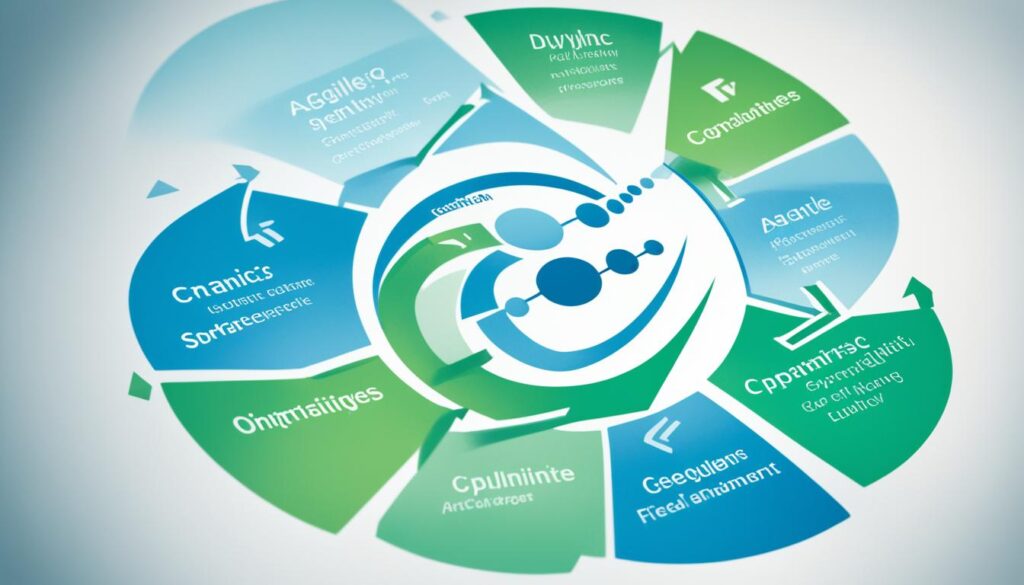The healthcare industry is undergoing unprecedented transformations driven by technological advancements, demographic shifts, and global challenges. Strategic management plays a pivotal role in ensuring the resilience and sustainability of healthcare organizations. This article explores the concept of future-proofing healthcare from a strategic management perspective, highlighting key strategies and considerations for navigating the complexities of the evolving healthcare environment.
Key Takeaways
- The healthcare industry faces a myriad of challenges, including an aging population, rising healthcare costs, and the increasing demand for innovative treatments and technologies.
- Strategic management in healthcare requires a long-term focus, strong organizational leadership, and the ability to navigate the complexity and uncertainty inherent in healthcare systems.
- Embracing technological advancements, such as telemedicine, artificial intelligence, and data analytics, is crucial for enhancing patient care, streamlining operations, and improving overall efficiency.
- Collaborative partnerships and strategic alliances can foster knowledge exchange, resource sharing, and the creation of a more resilient and adaptable healthcare ecosystem.
- Preventive healthcare and population health initiatives can help reduce the burden on healthcare systems and improve overall patient outcomes.
Understanding Future Challenges in Health Management
As the healthcare industry ventures into the future, organizations face a myriad of challenges that require strategic management to navigate effectively. The aging population, rising healthcare costs, and the increasing demand for innovative treatments and technologies are just a few of the key issues healthcare leaders must address. Additionally, global health crises, such as the COVID-19 pandemic, underscore the importance of preparedness and adaptability in the face of unforeseen challenges.
Aging Population and Rising Healthcare Costs
The aging population is placing a significant strain on healthcare systems, with a growing number of elderly individuals requiring more comprehensive and costly medical care. Healthcare managers must develop strategies to manage the rising costs associated with an aging population, while ensuring that the quality of care remains high and accessible to all patients.
Increasing Demand for Innovative Treatments and Technologies
Advancements in medical research and technology have led to the development of groundbreaking treatments and innovative healthcare solutions. However, the integration and adoption of these new technologies can be complex and costly, requiring healthcare managers to carefully navigate the landscape of emerging innovations and ensure their implementation aligns with organizational goals and patient needs.
Preparedness and Adaptability for Global Health Crises
The COVID-19 pandemic has highlighted the critical importance of preparedness and adaptability in the healthcare industry. Healthcare managers must develop contingency plans and strategies to ensure their organizations are equipped to respond effectively to future global health crises, minimizing the impact on patient care and community health.
Strategic Management in Healthcare

Strategic management involves the formulation and implementation of initiatives to achieve long-term organizational goals. In the context of healthcare, this approach requires a proactive stance to address current challenges while anticipating and preparing for future uncertainties.
Definition and Key Dimensions
The key dimensions of strategic management in healthcare include a long-term focus, organizational leadership, and navigating the complexity and uncertainty inherent in healthcare systems. Healthcare managers and administrators must strike a balance between addressing immediate needs and cultivating a resilient, future-ready organization.
Long-term Focus and Organizational Leadership
Effective strategic management in healthcare requires a long-term perspective that goes beyond short-term operational concerns. Healthcare leaders must develop and implement strategies that enhance the organization’s competency, efficiency, and resilience over time. This involves aligning the organization’s vision, mission, and goals with the evolving needs of patients, healthcare professionals, and the broader industry.
Complexity and Uncertainty in Healthcare Systems
The healthcare industry is characterized by a high degree of complexity and uncertainty, driven by factors such as rapidly evolving technologies, changing regulations, and shifting patient and community needs. Strategic management in this context requires the ability to navigate these dynamic environments, monitor emerging trends, and adapt organizational strategies accordingly. Healthcare managers must demonstrate the agility and foresight to ensure their organizations remain relevant and responsive in the face of constant change.
Innovation and Technology Integration

The healthcare industry is undergoing a transformative shift, driven by the rapid advancements in technology. Healthcare managers and organizations must embrace innovative solutions to future-proof their healthcare facilities and ensure their long-term sustainability. Two key areas of focus in this regard are telemedicine and artificial intelligence, as well as data analytics and operational efficiency.
Telemedicine and Artificial Intelligence
The integration of telemedicine has become increasingly crucial in the modern healthcare industry. By leveraging digital platforms and communication technologies, healthcare providers can now deliver high-quality patient care remotely, improving access and convenience for patients, especially in underserved or remote areas. Artificial intelligence (AI) is also making significant strides in the healthcare sector, enhancing clinical decision-making, streamlining administrative processes, and optimizing resource utilization.
Data Analytics and Operational Efficiency
Harnessing the power of data analytics can enable healthcare managers to make more informed and data-driven decisions. By collecting, analyzing, and interpreting vast amounts of healthcare data, organizations can gain valuable insights that can lead to improved operational efficiency, enhanced patient outcomes, and better overall healthcare services.
Research and Development Investment
To stay at the forefront of innovation, healthcare organizations must prioritize investments in research and development (R&D). By dedicating resources to exploring new technologies, treatments, and delivery models, healthcare managers can position their facilities to be agile and responsive to the evolving healthcare landscape. This commitment to innovation can ultimately drive better patient care, improved population health, and increased organizational efficiency.
Strategic Partnerships and Collaborations

In the ever-evolving healthcare landscape, strategic partnerships and collaborations have emerged as pivotal enablers for future-proofing healthcare organizations. By fostering knowledge exchange and resource sharing, these alliances can help healthcare leaders navigate the complexities of the industry.
Knowledge Exchange and Resource Sharing
Collaborations with other healthcare institutions, research organizations, and technology companies can facilitate the exchange of valuable insights and best practices. This knowledge sharing allows healthcare managers to stay abreast of the latest advancements, innovative treatments, and effective operational strategies. Furthermore, by pooling resources, healthcare organizations can leverage complementary expertise and infrastructure, unlocking new possibilities for patient-centric care delivery and operational efficiency.
Building a Resilient and Adaptable Ecosystem
Strategic partnerships enable healthcare organizations to create a more resilient and adaptable ecosystem. By working together, healthcare leaders can develop contingency plans, share risk, and enhance their collective ability to respond to emerging challenges. This collaborative approach fosters a culture of innovation, allowing healthcare organizations to pivot quickly and capitalize on new opportunities, ultimately strengthening their position in the ever-evolving healthcare industry.
| Key Benefits of Strategic Partnerships | Metrics for Evaluating Partnership Success |
|---|---|
|
|
Preventive Healthcare and Population Health

In the ever-evolving healthcare landscape, strategic management must prioritize a proactive approach to care. By shifting the emphasis from reactive to preventive measures, healthcare organizations can not only improve population health but also reduce the burden on their systems. This forward-thinking strategy encompasses innovative wellness programs and impactful community outreach initiatives.
Wellness Programs and Community Outreach
Comprehensive wellness programs that address the holistic needs of patients and communities are essential for promoting healthier lifestyles and preventing the onset of chronic conditions. Healthcare managers must collaborate with community stakeholders to develop tailored initiatives that empower individuals to take an active role in their own healthcare management. These programs may include educational workshops, fitness classes, nutrition counseling, and early detection screenings, all designed to foster a culture of preventive care and proactive health management.
Strengthening community outreach efforts is another crucial component of this strategic approach. Healthcare organizations can leverage their expertise and resources to engage with local communities, providing access to valuable health services and resources. By establishing partnerships with community centers, schools, and religious institutions, healthcare leaders can reach underserved populations, addressing disparities and promoting equitable access to preventive care.
Reducing Burden on Healthcare Systems
Empowering individuals and communities to take an active role in their health can have a significant impact on reducing the burden on healthcare systems. By investing in preventive healthcare and population health initiatives, healthcare organizations can mitigate the strain on resources, lower hospitalization rates, and improve overall system efficiency. This proactive approach not only enhances patient outcomes but also optimizes the utilization of healthcare facilities and services.
Agile Decision-Making and Adaptability

In the rapidly evolving healthcare industry, organizations must embrace agile decision-making processes to stay ahead of the curve. Strategic management plays a crucial role in fostering a culture of adaptability, enabling healthcare institutions to pivot quickly in response to emerging trends and unforeseen challenges.
Rapid Response to Emerging Trends
Healthcare leaders must cultivate a keen awareness of industry developments and emerging technologies. By actively monitoring the landscape, they can make timely and informed decisions to capitalize on new opportunities and mitigate potential risks. This agile approach allows healthcare organizations to rapidly adapt their strategies, operations, and service delivery models to meet the changing needs of patients, healthcare providers, and other stakeholders.
Fostering a Culture of Adaptability
Nurturing a culture of adaptability within the healthcare workforce is essential for navigating the uncertainties of the future. Strategic management should empower employees at all levels to identify and address challenges, encouraging a collaborative and innovative mindset. By fostering an environment that embraces change and promotes continuous learning, healthcare organizations can enhance their resilience and responsiveness, ensuring they remain relevant and competitive in the evolving industry landscape.
Health Management Workforce and Leadership

As the healthcare industry navigates a rapidly evolving landscape, the need for a robust and skilled workforce has never been more pressing. However, the sector faces a looming shortage of healthcare professionals, coupled with growing concerns over burnout and the ongoing imperative to adapt to technological advancements and shifting patient expectations.
Skill Development and Continuous Learning
Strategic healthcare management must prioritize the cultivation of a workforce equipped with the necessary competencies to excel in this dynamic environment. This requires a focus on skill development and continuous learning, ensuring healthcare professionals at all levels can enhance their expertise, stay abreast of industry trends, and adapt to new challenges. By investing in comprehensive training programs and fostering a culture of lifelong learning, healthcare organizations can build a versatile and future-ready workforce.
Addressing Burnout and Staffing Shortages
Burnout and staffing shortages pose significant threats to the resilience and effectiveness of healthcare systems. Strategic leaders must implement proactive measures to address these issues, such as implementing robust wellness initiatives, optimizing workloads, and enhancing employee engagement and support. By addressing the root causes of burnout and implementing innovative staffing strategies, healthcare organizations can retain and nurture their most valuable asset – their people.
Cultivating Distributed Leadership
In the face of mounting complexity and the need for agile decision-making, healthcare organizations must move beyond traditional top-down leadership structures. Strategic management should focus on cultivating a distributed leadership model, empowering healthcare professionals at all levels to take ownership, drive innovation, and collaborate effectively. This approach fosters a culture of accountability, empowerment, and continuous improvement, enabling the organization to navigate challenges and seize emerging opportunities with greater agility.
Value-Based Care and Patient-Centered Approaches

As the healthcare industry continues to evolve, a shift towards value-based care and patient-centered approaches has become a strategic imperative for healthcare leaders. This shift emphasizes the alignment of organizational infrastructure and incentives to improve patient outcomes and satisfaction, ultimately leading to better overall healthcare efficiency and effectiveness.
Aligning Infrastructure and Incentives
Transitioning to a value-based care model requires healthcare organizations to carefully align their internal infrastructure and incentive structures. This involves integrating advanced healthcare analytics and data-driven decision-making processes, as well as ensuring that provider incentives are closely tied to patient outcomes and satisfaction. By fostering this alignment, healthcare organizations can create a seamless, patient-centric experience that drives improved patient outcomes and organizational efficiencies.
Improving Patient Outcomes and Satisfaction
At the heart of value-based care is a focus on enhancing patient outcomes and satisfaction. Healthcare leaders must prioritize strategies that improve patient experiences, such as implementing personalized care plans, leveraging telehealth solutions, and fostering stronger patient-provider relationships. By placing the patient at the center of the care delivery model, healthcare organizations can drive better health outcomes and greater patient satisfaction, ultimately enhancing the overall value of the services they provide.
Also Read: Medical Or Health Services Manager : Manage Healthcare Operations
Conclusion
Future-proofing healthcare demands a strategic management approach that anticipates challenges, embraces innovation, and fosters resilience. By integrating these principles into their organizational fabric, healthcare institutions can navigate the uncertainties of the future, providing high-quality care while remaining adaptable in the face of evolving dynamics.
As the healthcare industry continues to evolve, strategic leaders must be proactive in addressing the aging population, rising costs, and the demand for innovative treatments and technologies. Leveraging data analytics, artificial intelligence, and telemedicine can enhance operational efficiency and improve patient outcomes.
Fostering strategic partnerships and collaborations will enable healthcare organizations to pool resources, share knowledge, and create a more resilient ecosystem. Simultaneously, a focus on preventive healthcare and population-based approaches can reduce the burden on healthcare systems and improve overall community well-being.
Ultimately, the future of healthcare lies in the hands of agile, adaptable, and visionary leaders who can guide their organizations through the complexities of the ever-changing landscape. By embracing strategic management principles, healthcare institutions can position themselves for long-term success and ensure the delivery of exceptional patient-centered care.
FAQs
Q: What is Strategic Health Management?
A: Strategic Health Management involves navigating challenges and opportunities within the field of health services to ensure efficient and effective delivery of healthcare.
Q: What are the key responsibilities of a health services manager?
A: Health services managers are responsible for overseeing the operations of health organizations, ensuring compliance with health policies, managing budgets, and coordinating administrative functions within healthcare settings.
Q: What qualifications are required to work in health services management?
A: To work in health services management, individuals typically need a bachelor’s degree in health care management or a related field, along with relevant work experience in healthcare settings.
Q: Why is accreditation important in health services management?
A: Accreditation ensures that healthcare facilities meet certain standards of quality and safety, enhancing the credibility and reputation of the organization while ensuring compliance with regulatory requirements.
Q: How do health managers navigate the complex health systems?
A: Health managers use their expertise in healthcare management and policy to navigate the complex health systems, ensuring smooth operations and effective delivery of care within the organization.
Q: What is the role of health managers in managing finances within healthcare settings?
A: Health managers oversee budgeting, financial planning, and revenue management within healthcare settings to ensure optimal resource allocation and financial sustainability of the organization.
Q: How does work experience contribute to the success of health managers?
A: Work experience in healthcare settings provides health managers with the necessary skills and knowledge to effectively navigate challenges, make informed decisions, and lead teams towards achieving organizational objectives.
Source Links
- https://www.linkedin.com/pulse/future-proofing-healthcare-strategic-management-perspective-y-v-uydgf
- https://www.ncbi.nlm.nih.gov/pmc/articles/PMC9324431/
- https://ache-cahl.org/articles/strategic-leadership-in-healthcare-addressing-growth-modernization-and-workforce-challenges/




